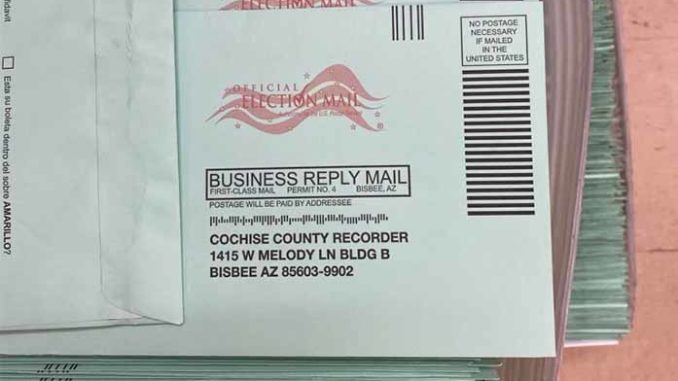
The Cochise County Sheriff’s Office is investigating how mail-in ballots for the 2020 general election were submitted by two voters who appear to have died before early voting began, the Arizona Daily Independent has confirmed.
Cochise County Recorder David Stevens said his staff processed nearly 49,000 early voting ballot envelopes, each of which is to have a signed affidavit from the voter. Two of the envelopes, however, were identified as being signed by voters who according to public records died prior to Oct. 7, the date early ballots were mailed out to many voters.
Stevens said the two ballots did not get tabulated, and there appears to be no connection between the two voters.
“The law says you vote your ballot and only your ballot, not someone else’s,” Stevens said, And the affidavit portion of the ballot envelope clearly shows only the registered voter is to sign.”
Sheriff Mark Dannels confirmed his office received Stevens’ Nov. 5 report regarding possible voter fraud. The matter has been assigned to a detective who is investigating the circumstances of both ballots.
“Our nation’s election system is the backbone to the people’s voice and anyone that interferes with this process violates our democracy,” Dannels said. “Upon completion, these investigations will be turned over to the Cochise County Attorney’s Office for review.”
Under Arizona Revised Statute 16-547, the mail-in ballot envelope contains an affidavit requiring a voter to declare under penalty of perjury to personally filling out the ballot and signing the affidavit. There is an exception if the voter needs to be assisted by someone, but the assistant must also sign an affidavit of their involvement
But that exception doesn’t apply if the voter died before the election, even if the county mailed out the early voting ballot before the recorder’s office knew of the voter’s death.
Arizona’s Loyalty Oath, commonly called the Oath of Office, requires elected officials to affirm they will “support the Constitution of the United States and the Constitution and laws of the State of Arizona” as well as “faithfully and impartially discharge the duties” of their office.
Stevens believes his oath of office required him to refer the two ballots for investigation, even if Dannels’ detective finds there was no criminal intent involved.
“My responsibility is to follow and uphold the election laws and procedures,” he said. “If I see something questionable then it needs to be pointed out. Sheriff Dannels and the county attorney take it from there.”
Should the investigation conclude that a state election law was violated then Cochise County Attorney Brian McIntyre must decide whether to prosecute. He appears to have a few statutes to choose from.
Arizona Revised Statute 16-1005 states any person “who knowingly marks a voted or unvoted ballot or ballot envelope” is guilty of a Class 5 felony if done “with the intent to fix an election for that person’s own benefit or for that of another person.” However, it’s unclear whether one illegally cast ballot shows intent to fix an election.
Another statute, ARS 16-184, states any person “who knowingly swears falsely to an affidavit required under the provisions of this chapter is guilty of a class 5 felony unless another classification is specifically prescribed in this chapter.”
And there is ARS 16-1016 which addresses illegal voting. It reads that a person is guilty of a Class 5 felony who “not being entitled to vote, knowingly votes,” or who “knowingly votes more than once at any election.”
Each of the state’s 15 county recorders are responsible for keeping their voter registration systems up-to-date. They are aided by the Arizona Secretary of State’s Office, which receives a record each month from the Arizona Department of Health Services of reported deaths in the preceding month.
The ADHS record includes the decedent’s name, date of birth, usual legal residence, and if known, social security number and descendant’s father’s name or mother’s maiden name to ensure the correct voter registration file is canceled.
A registered voter who passes away after casting a valid ballot is entitled to have their ballot tabulated, Stevens noted.
